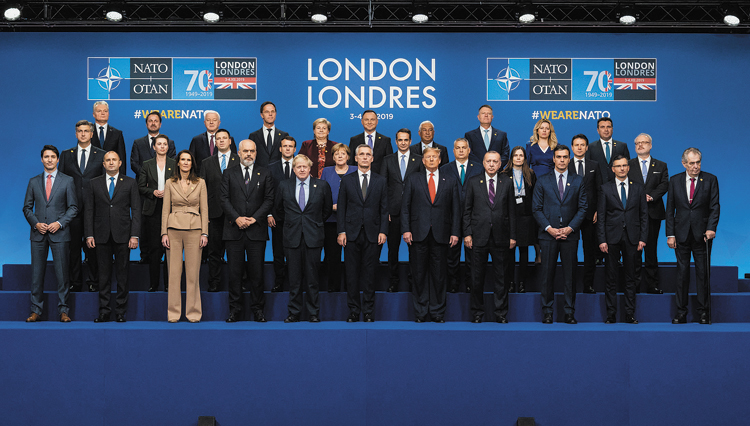Colonel Jasenko KROVINOVIĆ, head of the Communications and Information Systems Directorate of the General Staff…
“As the world changes, NATO will continue to change “

NATO meeting in London was not only a ceremony to mark the seven decades of NATO but entailed, as regularly, a series of meetings and other activities. The world media highlighted the disagreements between ons of individual member nations, with different histories, different geography and different political parties in power but decisions in NATO are taken by consensus. NATO Secretary General Jens Stoltenberg also highlighted it: “We have had disagreements in this Alliance since the Suez Crisis in the 1950ies, to the Iraq War in 2003“.
“Regardless of the disagreeing opinions NATO is strong”, said Prime Minister Andrej Plenković, who headed the Croatian delegation at the meeting, composed of the Deputy Prime Minister and Defence Minister Damir Krstičević, by the Foreign and European Affairs Minister Gordan Grlić Radman, the Deputy Prime Minister and Defence Minister Damir Krstičević, the Chief of the General Staff of the Croatian Armed Forces General Mirko Šundov,. “There is cohesion inside NATO, there is also the commitment to Article V as well as to other provisions of the North Atlantic Treaty, whereby the member nations obliged themselves to invest into defence and to help each other in the event of a crisis situation“, said Prime Minister Plenković.
The dominant topics of the meeting was increase of budget allocated for defence purposes.
The investments for modernisation and strengthening of the Croatian Armed Forces are not just formal fulfilment of the commitments towards the Alliance:“For us it is important that the Croatian Armed Forces guarantee our security, and freedom won with the sacrifice by Croatian defenders, while NATO membership and Article V provide the collective security which today and in future will prevent any aggression against Croatia as the one experienced in the early 90-ies. The contribution to the collective security is mutual, and Croatia has proved its credibility through the fact that it has presently deployed 250 soldiers in NATO-led missions and operations“, emphasised Prime Minister Plenković.
The North Atlantic Treaty was founded by 12 member nations 70 years ago, in the early days of the Cold War. The Alliance is soon to embrace the 30th member – North Macedonia.
“As the world changes, NATO will continue to change“, concluded Secretary General Jens Stoltenberg. The next summit will be held in 2021.
The Croatian delegation attending the NATO meeting: Defence and National Security Advisor to the President of the Republic Zrinko Petener,the Foreign and European Affairs Minister Gordan Grlić Radman, the Prime Minister Andrej Plenković, the Deputy Prime Minister and Defence Minister Damir Krstičević, the Chief of the General Staff of the Croatian Armed Forces General Mirko Šundov, Foreign Policy Advisor to the Prime Minister Vladimir Drobnjak (photo credit: Government of the Republic of Croatia)
From the London Declaration:
Some of the highlights from the Joint Declaration endorsed by the heads of state and government at the London meeting as presented by NATO Secretary General:
- we reaffirm the enduring transatlantic bond between Europe and North America, our adherence to the purposes and principles of the United Nations Charter, and Article V of the North Atlantic Treaty.
- NATO is increasing our defence investment in line with its 2% and 20% guidelines, investing in new capabilities, and contributing more forces to missions and operations.
- Russia’s aggressive actions constitute a threat to Euro-Atlantic security; terrorism in all its forms and manifestations remains a persistent threat to us all. Instability beyond our borders is also contributing to irregular migration. The Alliance faces cyber and hybrid threats.
- NATO continues to upgrade its overall defence capabilities and as long as nuclear weapons exist,NATO will remain a nuclear alliance.
- NATO is increasing cooperation with the United Nations; the EU and partner nations. We are committed to NATO’s Open Door policy, as well as to long-term security and stability in Afghanistan.
NATO is addressing the breadth and scale of new technologies and of critical infrastructure and communications (including 5G, network); space has been declared an operational domain of NATO; China’s growing influence has been recognised, presenting both opportunities and challenges that t needs to be addressed at the level of the Alliance.
The meeting of the heads of state and government of NATO member nations held in London from 3 -4 December 2019 was not formally a summit, a common designation for NATO summit meetings of this level, though essentially it was the 29th summit held since 4 April 1949 which saw the establishment of the strongest military alliance in history. Interestingly, even the founding event in Washington was not referred to as summit either. The first nominal summit was held much later, in Paris from 16 – 19 December 1957, and the second one in Brussels 17 years later (26 June 1974), after which the summits assumed a more regular pace ( one to three years, sometimes two summits in a year, with one four-year break – the 5th summit was held in 1978 and the 6th in 1982.
Croatian version:

